Natsumi Komatsu, Graduate Student in Electrical and Computer Engineering, kindly shared these slides with us from her presentation to Japanese students on pursuing a graduate degree in the United States, with additional focus on pursuing the doctoral or Ph.D. degree. You can download the full presentation here via PDF, or view it below!

アメリカ大学院について | About American Graduate School
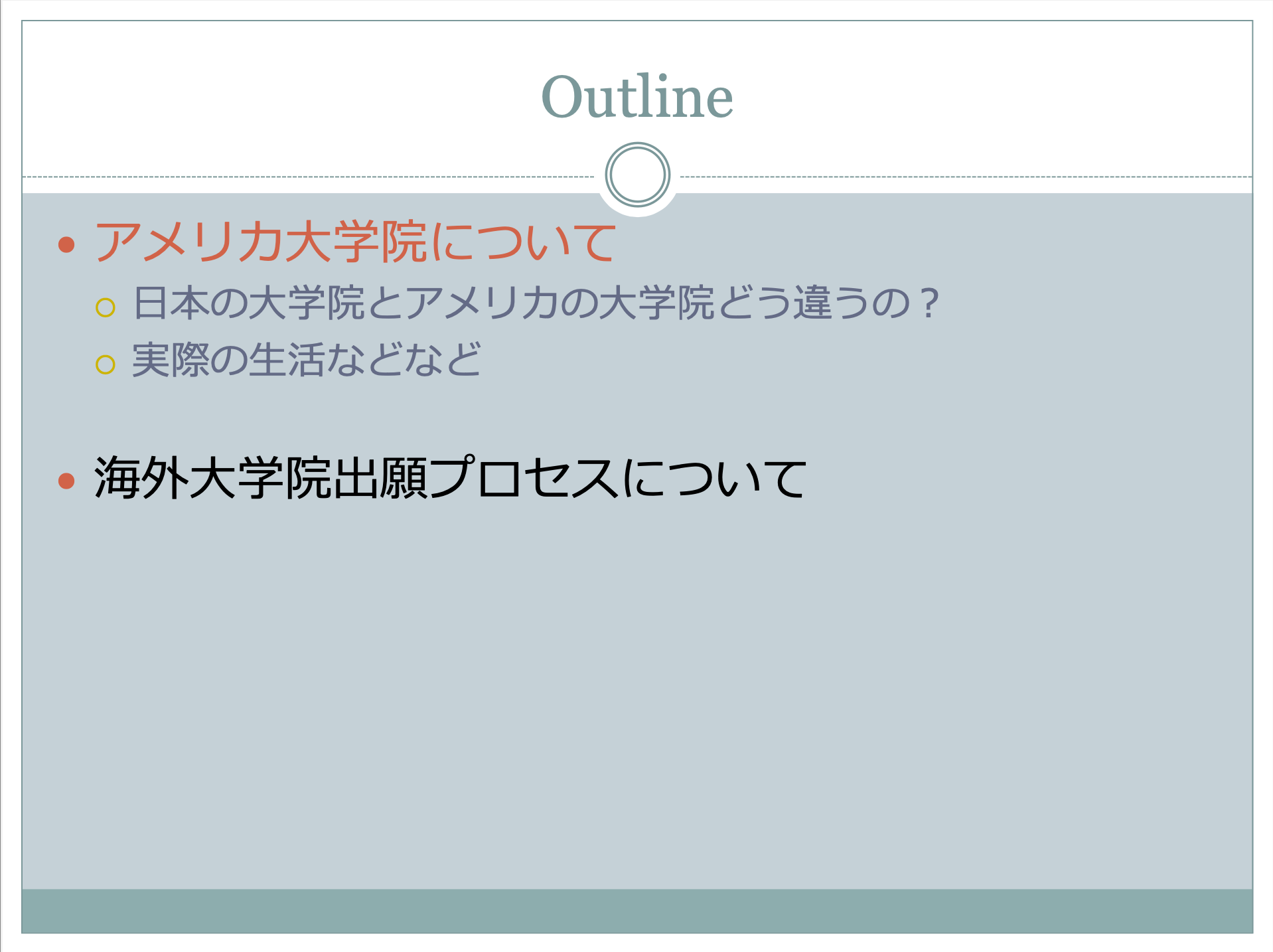
Alt Text: 海外大学院出願プロセスについて | The US Grad School Application Process
The outline of this presentation:
- アメリカ大学院について
- 日本の大学院とアメリカの大学院どう違うの?
- 実際の生活などなど
- 海外大学院出願プロセスについて
- All about graduate school in America
- What is the difference between graduate school in Japan and America?
- What is life like in the U.S.?
- The Graduate School Application Process
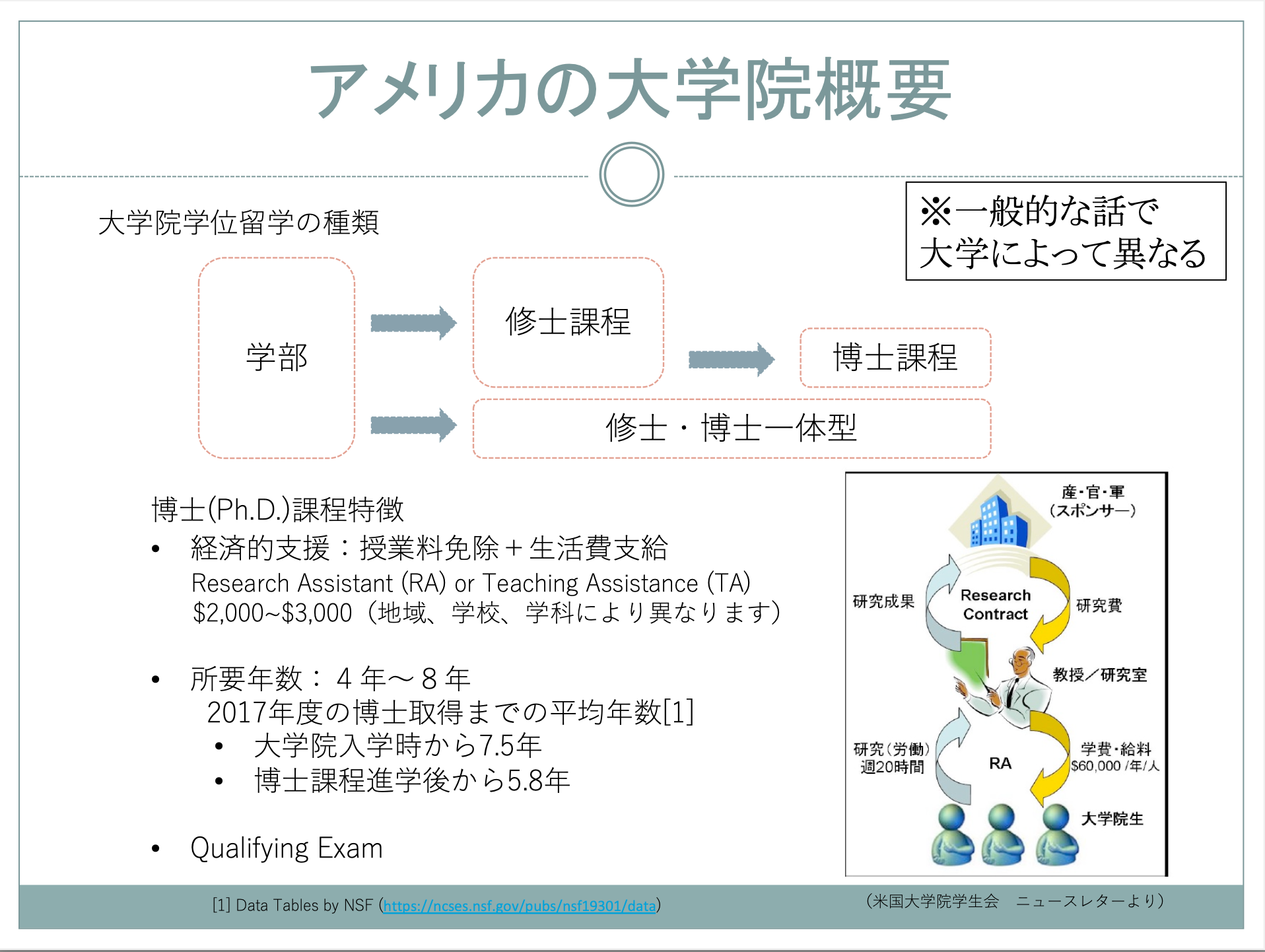
アメリカの大学院概要 | About American Graduate School
大学院学位留学の種類
※一般的な話で 大学によって異なる
博士(Ph.D.)課程特徴
- 経済的支援:授業料免除+生活費支給
- Research Assistant (RA) or Teaching Assistance (TA)
- $2,000~$3,000(地域、学校、学科により異なります)
- 所要年数:4年〜8年 2017年度の博士取得までの平均年数[1]
- 大学院入学時から7.5年
- 博士課程進学後から5.8年
- Qualifying Exam
Types of degrees available vary by university. In the United States, you can earn a master’s or a doctoral degree directly from the bachelor’s degree. A master’s degree is not required to pursue a doctoral degree.
Ph.D. course features
- Financial support: tuition exemption + living expenses payment
- Research Assistant (RA) or Teaching Assistance (TA)
- $2,000 ~ $ 3,000 (depending on region, school and department)
- Required years: 4 to 8 years
- Qualifying Exam
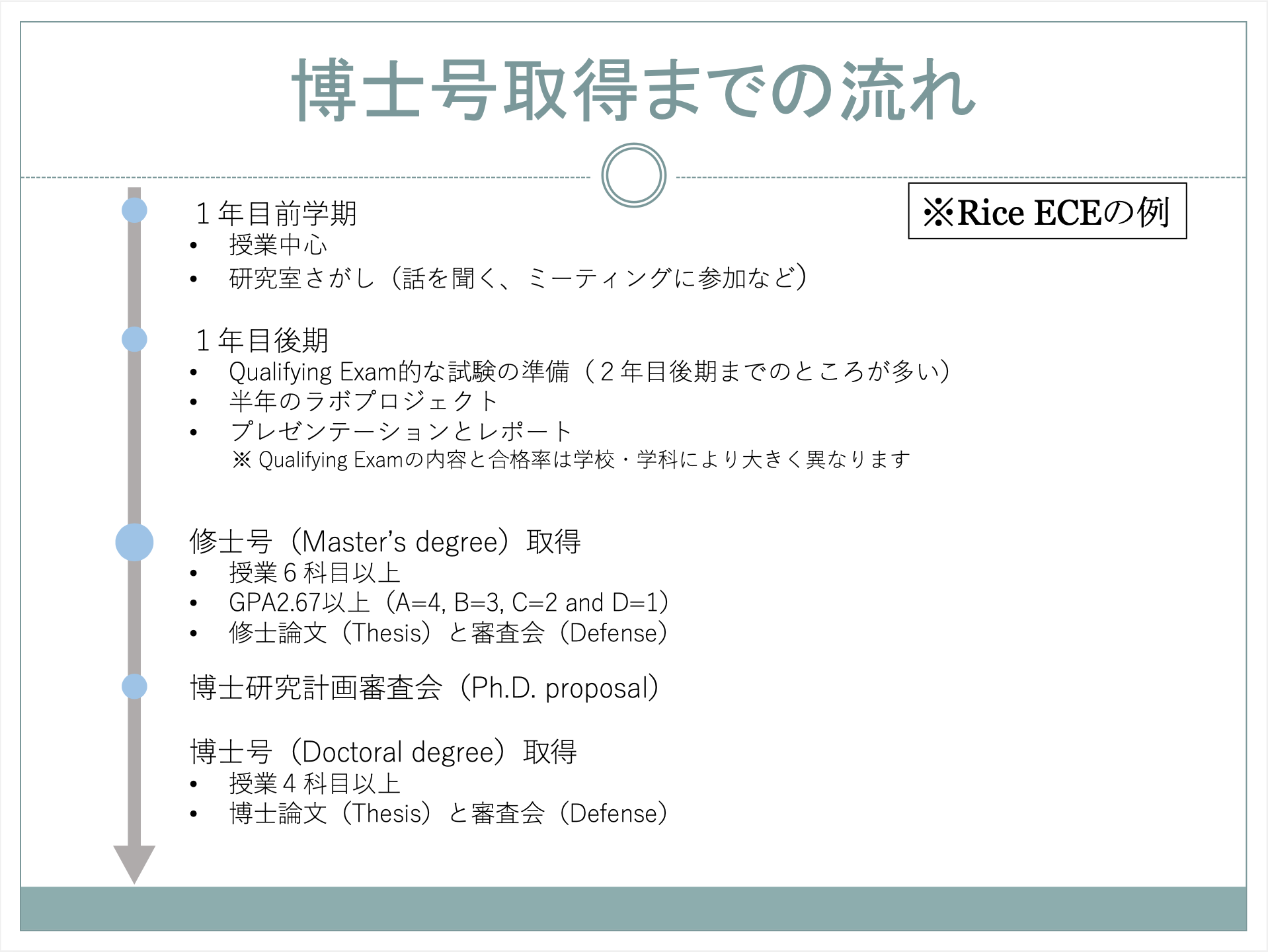
博士号取得までの流れ | Flow of getting a PhD
- 1年目前学期 • 授業中心
- 研究室さがし(話を聞く、ミーティングに参加など)
- 1年目後期
- Qualifying Exam的な試験の準備(2年目後期までのところが多い)
- 半年のラボプロジェクト
- プレゼンテーションとレポート
- ※ Qualifying Examの内容と合格率は学校・学科により大きく異なります
- 修士号(Masterʼs degree)取得
- 授業6科目以上
- GPA2.67以上(A=4, B=3, C=2 and D=1)
- 修士論文(Thesis)と審査会(Defense)
- 博士研究計画審査会(Ph.D. proposal)
- 博士号(Doctoral degree)取得
- 授業4科目以上
- 博士論文(Thesis)と審査会(Defense)
Using Rice’s Electrical and Computer Engineering doctoral program as an example, here is what you can expect the flow of your STEM doctoral degree to be.
First Semester / early first year:
- Class-centered
- Lab search (listening, attending meetings, etc.)
Second Semester / late first year:
- Preparation for 599 (This is a unique exam, similar to the qualifying exam, in the ECE department. Note that most departments do not have qualifying exams until the second half of the second year)
- *The content and pass rate of the Qualifying Exam vary greatly depending on the school / department.
- Half-year lab project
- Presentations and reports
Obtain a Master's degree (typically at the end of year two)
- 6 or more courses (vary greatly depending on the school / department)
- GPA 2.67 or higher (A = 4, B = 3, C = 2 and D = 1)
- Master's thesis (Thesis) and Judging Committee (Defense)
Ph.D. proposal
Obtain a Doctoral degree (typically in the 5th or 6th year)
- 4 or more courses (vary greatly depending on the school / department)
- Thesis and Defense
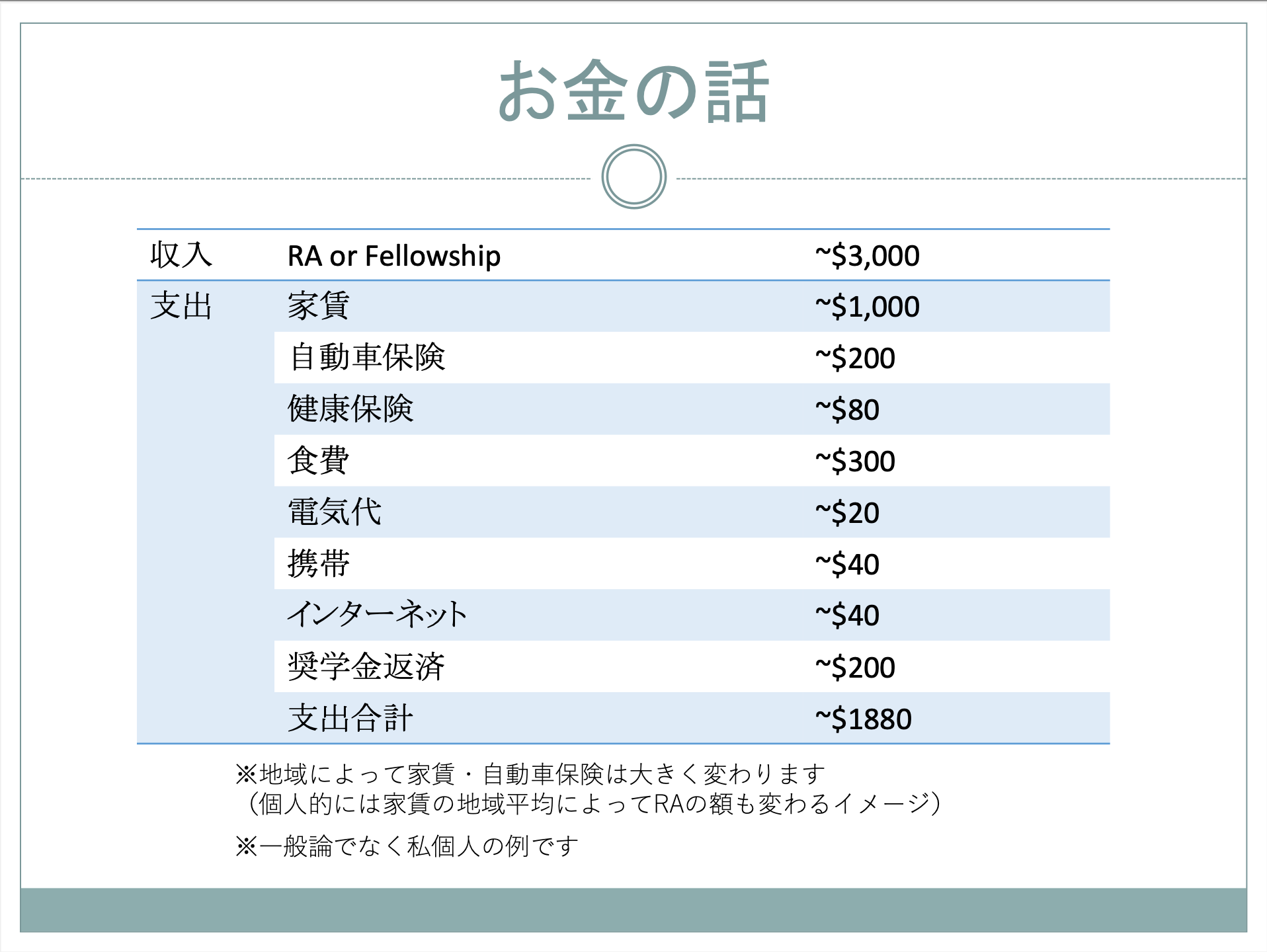
お金の話 | Finances
一般論でなく私個人の例です
This example uses a stipend of a student in a Rice Engineering doctoral program. Stipends vary greatly by program and by university, so keep this in mind when researching programs of study. This is a monthly example.
- 収入 | Income: ~$3,000
- 家賃 | Rent: ~$1,000
- 自動車保険 | Car Insurance: ~$200
- 健康保険 | Health Insurance: ~$80
- 食費 | Food: ~$300
- 電気代 | Electricity: ~$20
- 携帯 | Phone: ~$40
- インターネット | Internet: ~$40
- 奨学金返済 | Student Loan (for undergraduate study): ~$200
- 支出合計 | Total Expenditures: ~$1,880
地域によって家賃・自動車保険は大きく変わります (個人的には家賃の地域平均によってRAの額も変わるイメージ)
Rent and automobile insurance vary greatly depending on the region (personally, the amount of stipend also changes depending on the regional average of rent)
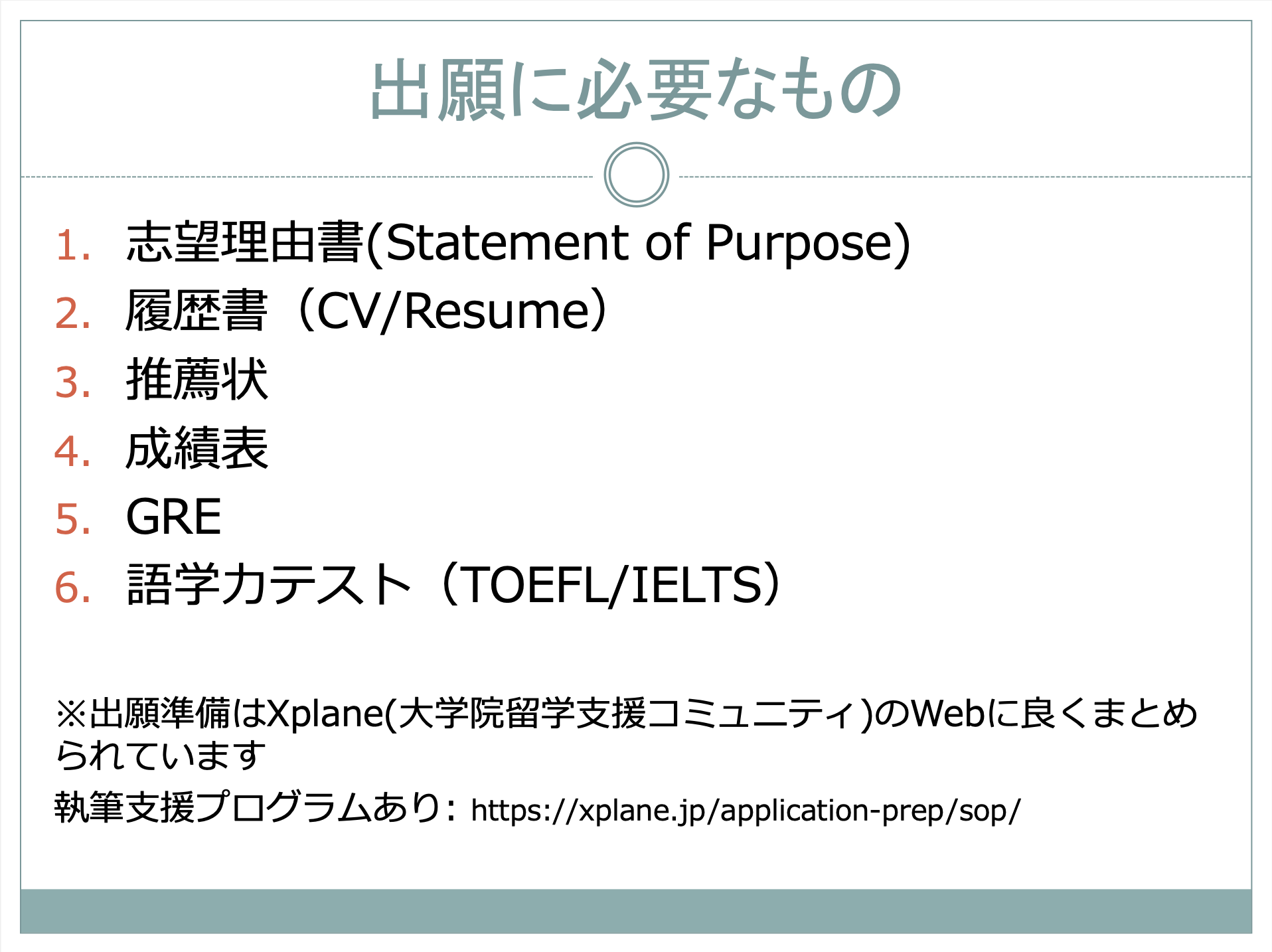
出願に必要なもの | What you need to apply
- 志望理由書(Statement of Purpose)
- 履歴書(CV/Resume)
- 推薦状 (Letter of Recommendation)
- 成績表 (Transcripts)
- GRE
- 語学力テスト(TOEFL/IELTS)
※出願準備はXplane(大学院留学支援コミュニティ)のWebに良くまとめ られています
執筆支援プログラムあり: https://xplane.jp/application-prep/sop/
Application preparation is well organized on the Xplane (Graduate School Study Abroad Support Community) website. There is an SOP writing support program: https://xplane.jp/application-prep/sop/
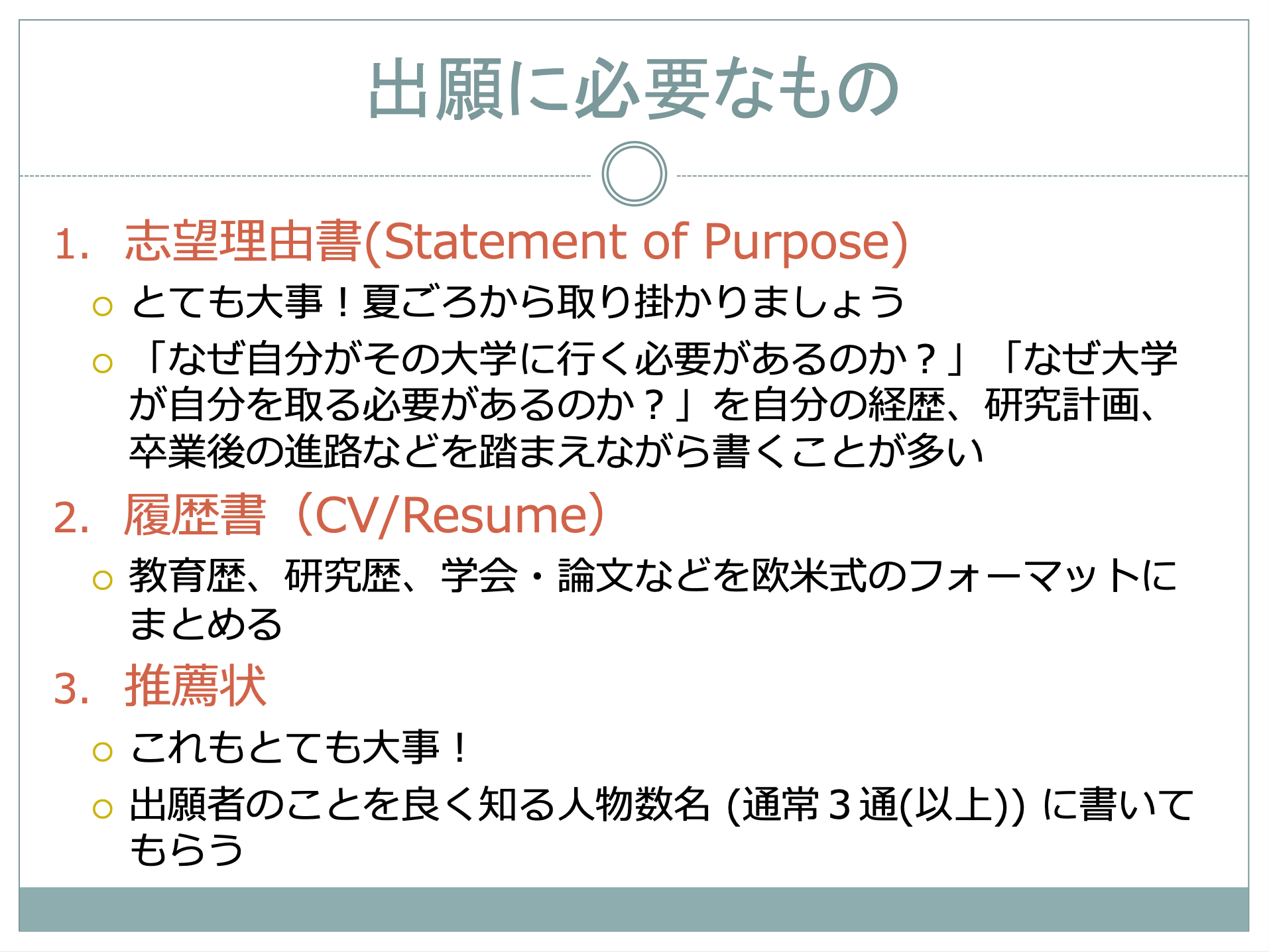
出願に必要なもの | What you need to apply, continued
1. 志望理由書(Statement of Purpose)
- とても大事!夏ごろから取り掛かりましょう
- 「なぜ自分がその大学に行く必要があるのか?」「なぜ大学 が自分を取る必要があるのか?」を自分の経歴、研究計画、 卒業後の進路などを踏まえながら書くことが多い
2. 履歴書(CV/Resume)
- 教育歴、研究歴、学会・論文などを欧米式のフォーマットに まとめる
3. 推薦状
- これもとても大事!
- 出願者のことを良く知る人物数名 (通常3通(以上)) に書いて もらう
- Statement of Purpose
- Very important! Start writing this in the summer
- People often write about "Why do I need to go to that university?" And "Why am I a good fit to this school?" based on their background, research plan, career path after graduation, etc.
- Resume (CV / Resume)
- Summarize educational history, research history, academic societies, dissertations, etc. in Western format
- Letter of recommendation
- This is also very important!
- Ask several people (usually 3 (or more) who know the applicant well to write)
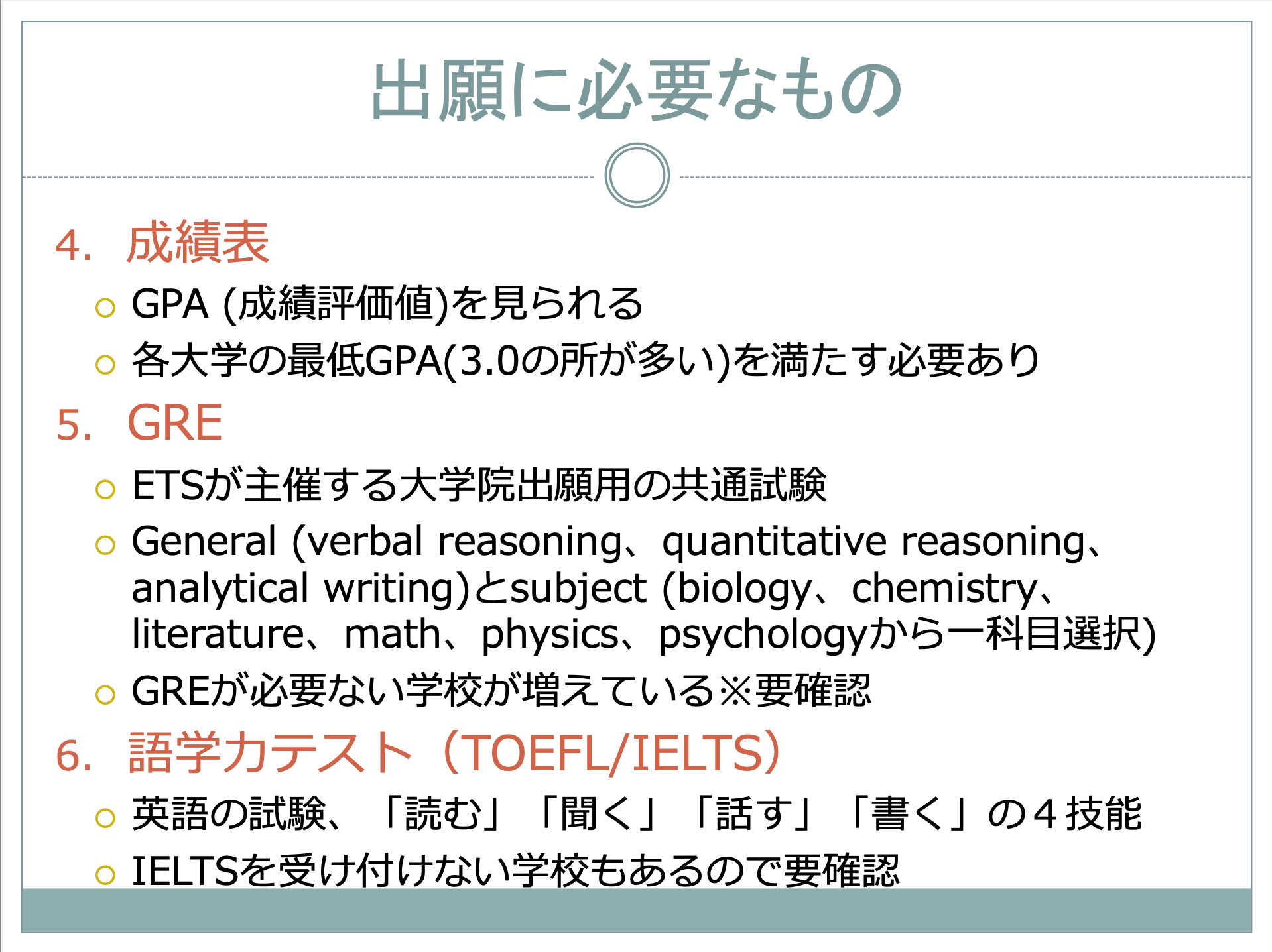
出願に必要なもの | What you need to apply, continued
4. 成績表
- GPA (成績評価値)を見られる
- 各大学の最低GPA(3.0の所が多い)を満たす必要あり
5. GRE
- ETSが主催する大学院出願用の共通試験
- General (verbal reasoning、quantitative reasoning、 analytical writing)とsubject (biology、chemistry、 literature、math、physics、psychologyから一科目選択)
- GREが必要ない学校が増えている※要確認
6. 語学力テスト(TOEFL/IELTS)
- 英語の試験、「読む」「聞く」「話す」「書く」の4技能
- IELTSを受け付けない学校もあるので要確認
4. Transcripts
- GPA must meet the minimum GPA of each university (mostly 3.0)
5. GRE
- Run by ETS, this is a common exam for graduate applications
- General (verbal reasoning, quantitative reasoning, analytical writing) and subject (choose one subject from biology, chemistry, literature, math, physics, psychology)
- The number of schools that do not require GRE is increasing - but confirm with your program what is needed.
6. Language Proficiency Test (TOEFL / IELTS / DuoLingo)
- English test, 4 skills of "reading", "listening", "speaking" and "writing"
- Some schools do not accept IELTS, so be sure to check
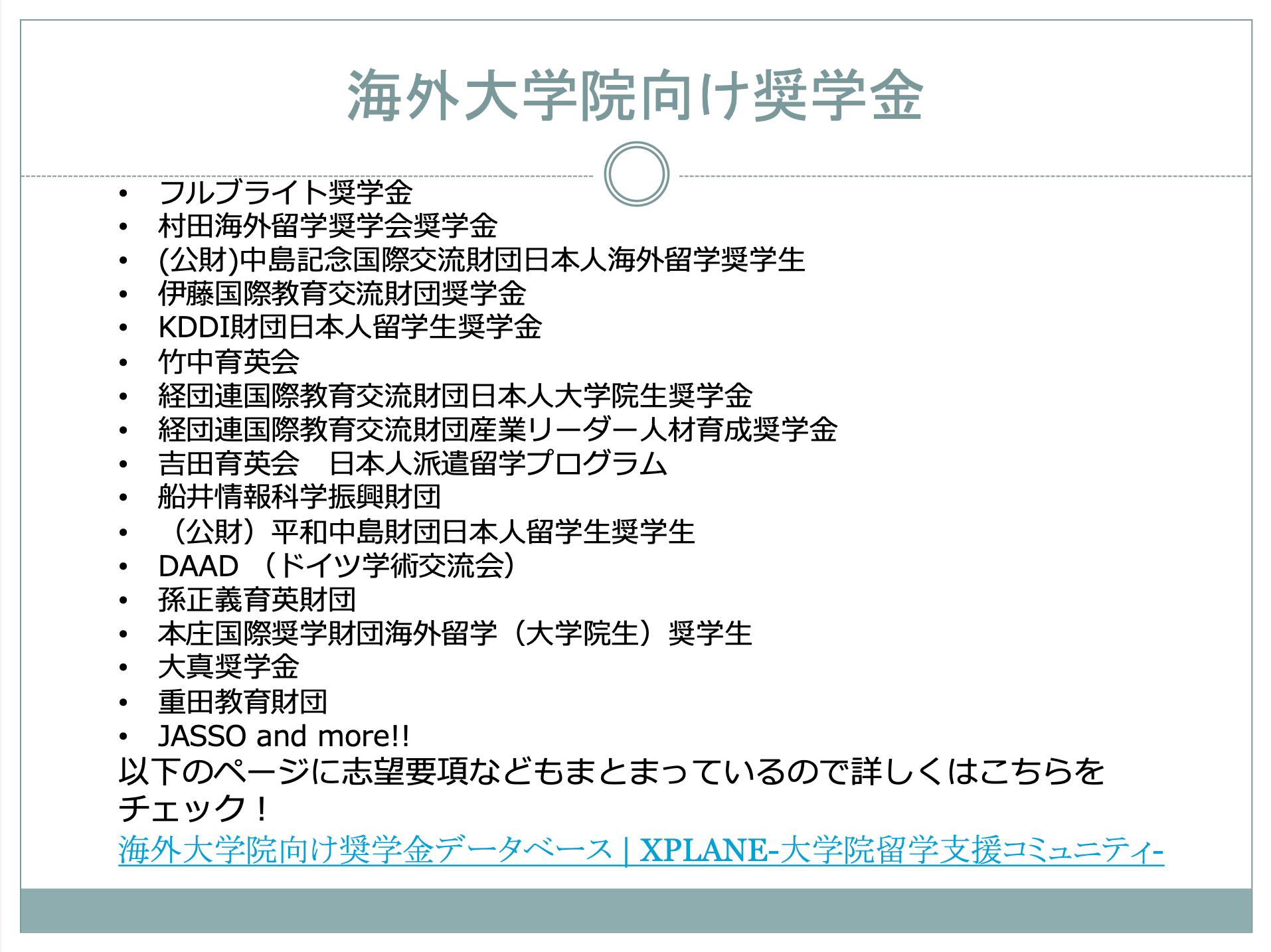
海外大学院向け奨学金 | Fellowships open to Japanese citizens
• フルブライト奨学金
• 村田海外留学奨学会奨学金
• (公財)中島記念国際交流財団日本人海外留学奨学生
• 伊藤国際教育交流財団奨学金
• KDDI財団日本人留学生奨学金
• 竹中育英会
• 経団連国際教育交流財団日本人大学院生奨学金
• 経団連国際教育交流財団産業リーダー人材育成奨学金
• 吉田育英会 日本人派遣留学プログラム
• 船井情報科学振興財団
• (公財)平和中島財団日本人留学生奨学生
• DAAD (ドイツ学術交流会)
• 孫正義育英財団
• 本庄国際奨学財団海外留学(大学院生)奨学生
• 大真奨学金
• 重田教育財団
• JASSO
and more!! 以下のページに志望要項などもまとまっているので詳しくはこちらを チェック!
海外大学院向け奨学金データベース
Scholarship Database for Overseas Graduate Schools | XPLANE-Graduate School Study Abroad Support Community
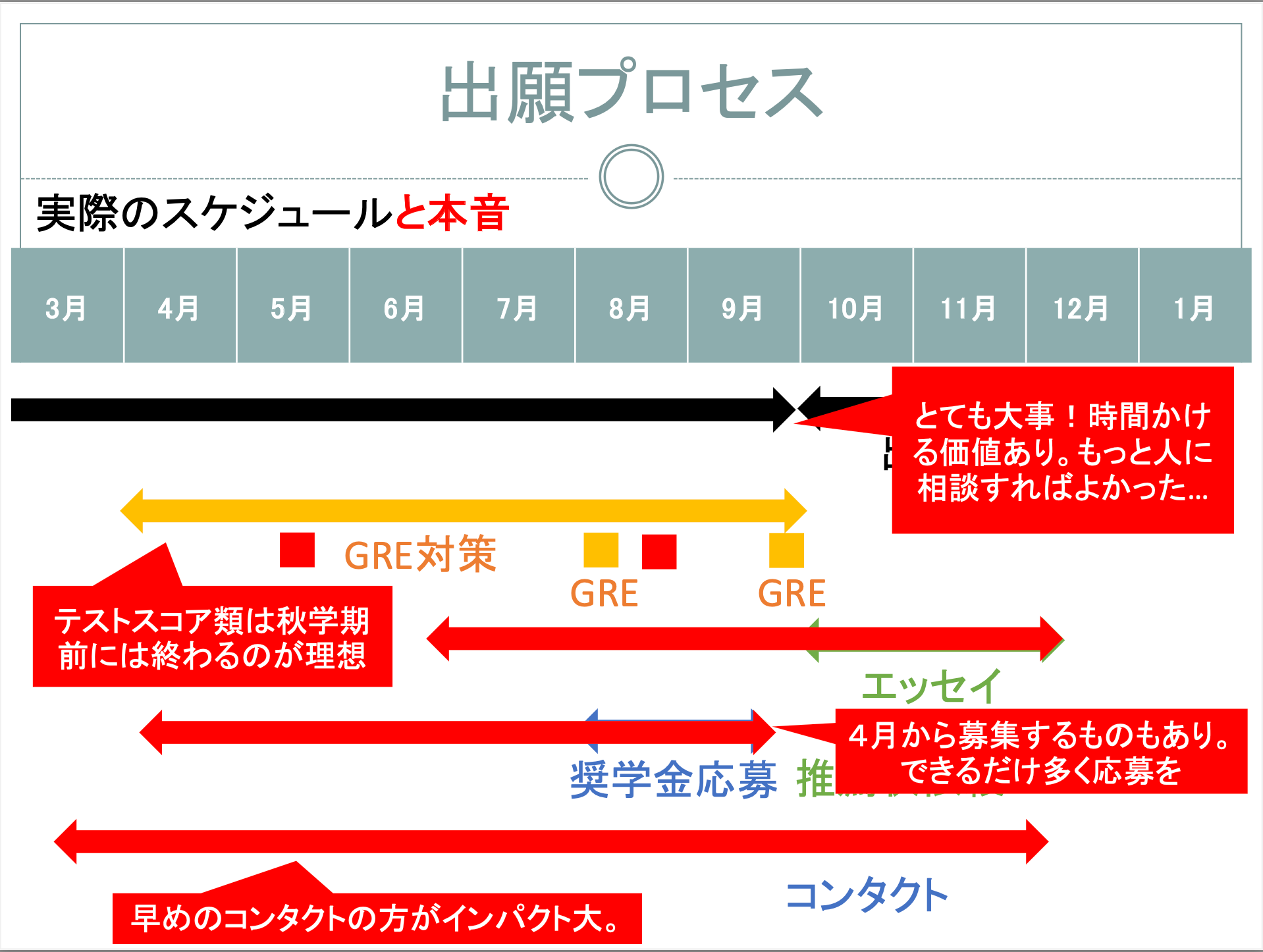
出願プロセス | Application Process
3月 コンタクト | March: reach out to research groups that you are interested in joining. 早めのコンタクトの方がインパクト大。
4月 4月から募集するものもあり。できるだけ多く応募を | April: Some applications are open as early as April. Apply to as many programs as possible.
5月 GRE対策 | テストスコア類は秋学期前には終わるのが理想. May: Ideally, test scores should be ready before the fall semester.
7月 奨学金応募 | July: Apply for Scholarships.
8月 エッセイ | August: Start writing SOP.
10月 推薦状依頼 | October: Ask for letters of recommendation
11月 出願 | November: Submit the application (be sure to check deadlines!)
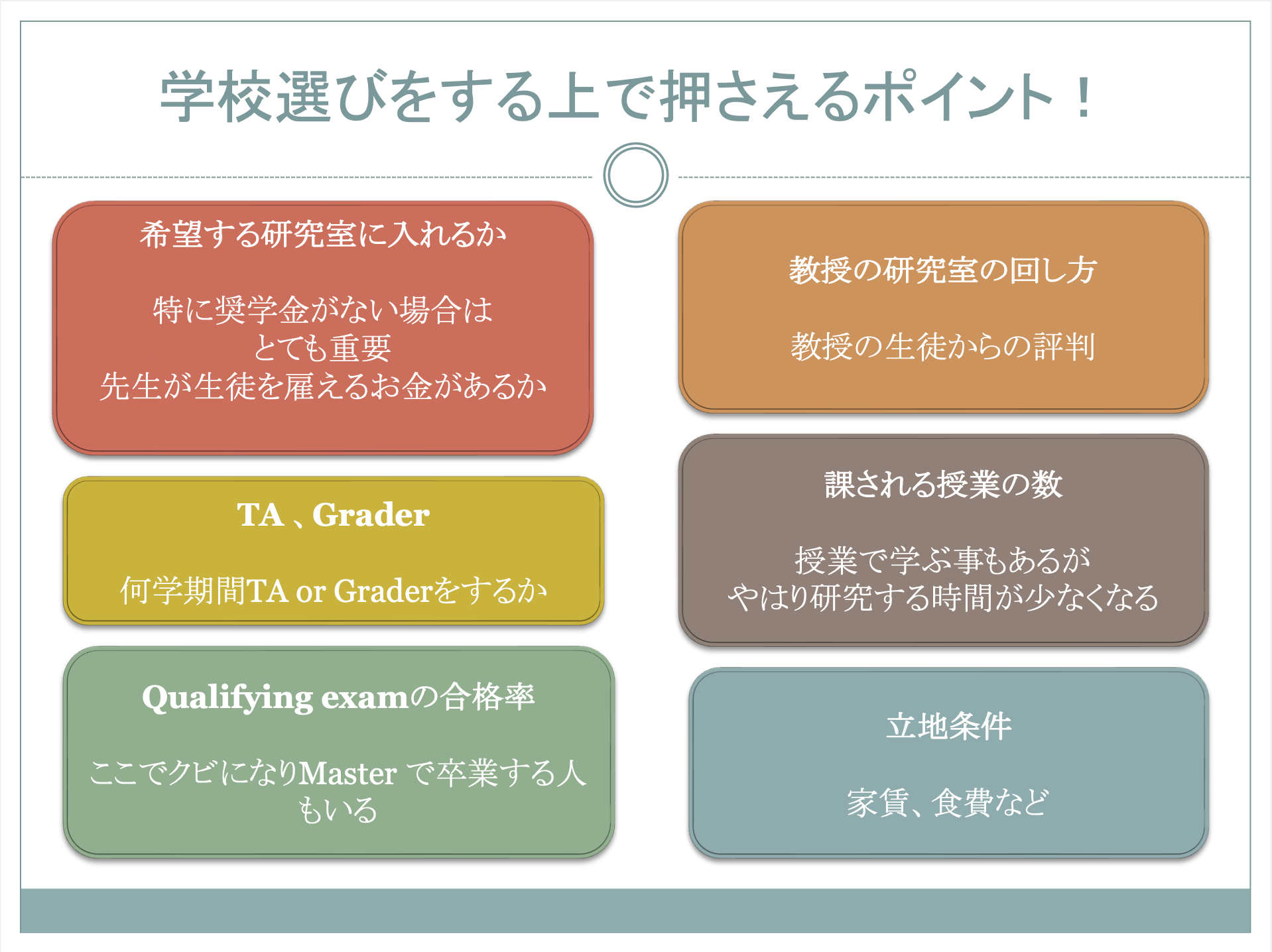
学校選びをする上で押さえるポイント!| Points to keep in mind when choosing a school
希望する研究室に入れるか
特に奨学金がない場合は
とても重要
先生が生徒を雇えるお金があるか
教授の研究室の回し方
教授の生徒からの評判
課される授業の数
授業で学ぶ事もあるが
やはり研究する時間が少なくなる
TA 、Grader
何学期間TA or Graderをするか
Qualifying examの合格率
ここでクビになりMaster で卒業する人もいる
立地条件
家賃、食費など
Do you want to enter the laboratory of your choice?
Especially important if you don’t have fellowship support.
Does the professor have the money to hire students?
How the principal investigator (PI) manages the lab
Are graduate students in the group happy? Is the PI more hands-on, or hands-off?
TA, grading responsibilities
How many semesters do you have to be a TA or grader?
Course requirements
Courses are great opportunities to learn, but taking too many courses can result in less time to research
Qualifying exam pass rate
Some people end here and graduate with a master’s
Location conditions
Rent, food expenses, etc.

